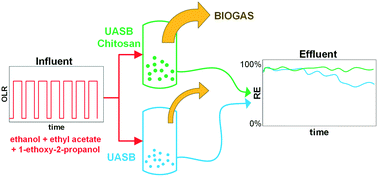Intermittent operation of UASB reactors treating wastewater polluted with organic solvents: process performance and microbial community evaluation†
Abstract
The effect of intermittent feeding on the treatment of wastewater polluted with ethanol, ethyl acetate and 1-ethoxy-2-propanol in anaerobic upflow sludge blanket reactors was investigated. Three laboratory-scale reactors, one periodically supplemented with chitosan, were operated in an intermittent pattern (16 hours per day; 5 days per week) during 5 months. Removal efficiencies higher than 94% were obtained at organic loading rates up to 50 kg COD m−3 d−1. The addition of chitosan positively affected the specific methanogenic activity of the granular sludge. Although partial deterioration of the granules was observed, it was not correlated with variations in the production of extracellular polymeric substances, the percentage of granules remained between 57 and 84%. Microbial community analysis showed the prevalence of bacteria of the genus Geobacter and archaea of the Methanocorpusculum genus were the most abundant methanogens, suggesting that hydrogenotrophic methanogenesis, with the syntrophic oxidation of the substrate, was an important pathway for solvent degradation.



 Please wait while we load your content...
Please wait while we load your content...